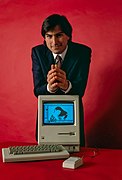Portal:Internet
The Internet PortalThe Internet (or internet) is the global system of interconnected computer networks that uses the Internet protocol suite (TCP/IP) to communicate between networks and devices. It is a network of networks that consists of private, public, academic, business, and government networks of local to global scope, linked by a broad array of electronic, wireless, and optical networking technologies. The Internet carries a vast range of information resources and services, such as the interlinked hypertext documents and applications of the World Wide Web (WWW), electronic mail, telephony, and file sharing. The origins of the Internet date back to research that enabled the time-sharing of computer resources, the development of packet switching in the 1960s and the design of computer networks for data communication. The set of rules (communication protocols) to enable internetworking on the Internet arose from research and development commissioned in the 1970s by the Defense Advanced Research Projects Agency (DARPA) of the United States Department of Defense in collaboration with universities and researchers across the United States and in the United Kingdom and France. The ARPANET initially served as a backbone for the interconnection of regional academic and military networks in the United States to enable resource sharing. The funding of the National Science Foundation Network as a new backbone in the 1980s, as well as private funding for other commercial extensions, encouraged worldwide participation in the development of new networking technologies and the merger of many networks using DARPA's Internet protocol suite. The linking of commercial networks and enterprises by the early 1990s, as well as the advent of the World Wide Web, marked the beginning of the transition to the modern Internet, and generated sustained exponential growth as generations of institutional, personal, and mobile computers were connected to the network. Although the Internet was widely used by academia in the 1980s, the subsequent commercialization in the 1990s and beyond incorporated its services and technologies into virtually every aspect of modern life. (Full article...) Selected articleThe iLoo (short for Internet loo) was a cancelled Microsoft project to develop a Wi-Fi Internet-enabled portable toilet. The iLoo, which was to debut at British summer festivals, was described as being a portable toilet with wireless broadband Internet, an adjustable plasma screen, a membrane wireless keyboard, a six-channel speaker system, and toilet paper embossed with popular web site addresses. The iLoo was also to have an extra screen and keyboard on the outside, and was to be guarded. It was intended as the next in a series of successful initiatives by MSN UK which sought to introduce the internet in unusual locations, including MSN Street, MSN Park Bench and MSN Deckchair. The project was announced by MSN UK on April 30, 2003, and was widely ridiculed before being declared a hoax by Microsoft on May 12. On May 13, another Microsoft press release stated that although the project had not been a hoax, it had been cancelled because it would do little to promote the MSN brand. There has since been speculation as to whether the project was cancelled for fear of being sued by Andrew Cubitt, who had invented the similarly named product "i-Loo". The iLoo was described as a public relations "debacle" by Online Journalism Review. Selected picture In computer networking, a wireless access point (WAP or AP) is a device that connects wireless communication devices together to form a wireless network. The WAP usually connects to a wired network, and can relay data between wireless devices and wired devices. Several WAPs can link together to form a larger network that allows "roaming". News
Wikinews Internet portal
WikiProjects
Did you know (auto-generated) -
Selected biography
Mark Elliot Zuckerberg (born May 14, 1984) is an American computer programmer and entrepreneur. As a Harvard College student he founded the online social networking service Facebook with the help of fellow Harvard student and computer science major Andrew McCollum as well as roommates Dustin Moskovitz and Chris Hughes. He now serves as Facebook's CEO. Zuckerberg launched Facebook from his Harvard dorm room on February 4, 2004. It quickly became a success at Harvard and more than two-thirds of the school's students signed up in the first two weeks. Zuckerberg then decided to spread Facebook to other schools and enlisted the help of roommate Dustin Moskovitz. They first spread it to Stanford, Columbia and Yale and then to other Ivy League colleges and schools in the Boston area. By the beginning of the summer, Zuckerberg and Moskovitz had released Facebook at almost 30 schools. Zuckerberg moved to Palo Alto, California with Moskovitz and some friends during the summer of 2004. They leased a small house which served as their first office. Over the summer, Zuckerberg met Peter Thiel who invested in the company. Today, the company has four buildings in downtown Palo Alto.
General images -The following are images from various internet-related articles on Wikipedia.
Selected quoteMore Did you know...
Main topics
Featured contentCategoriesRelated portalsThings you can do
Associated WikimediaThe following Wikimedia Foundation sister projects provide more on this subject:
Wikipedia's portals |





















































